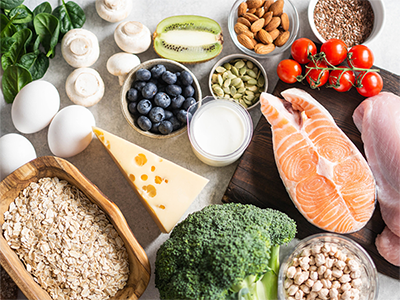
Top Vitamins for Breastfeeding Moms: A Complete Nutrition Guide
To support your postpartum recovery and your baby's growth, a nutrient-dense diet is essential. The right vitamins for breastfeeding moms can improve your energy, enrich your breast milk, and help increase your milk supply.
So, what should you put on your plate to get those quality calories? Focus on the vitamins and minerals you need to stay energized and support milk production.
Vitamins for Breastfeeding Moms
Here are the specific building blocks for your health and your baby's development, along with examples of foods suitable for breastfeeding mothers.
Vitamin A for vision and immune support
Vitamin A is essential for supporting your immune system and healthy vision. According to the World Health Organization (WHO), it’s passed on to your little one through your breast milk, where it plays a critical role in their developing eyesight and immune function.
Based on the Philippine Dietary Reference Intakes (PDRI) of the Food and Nutrition Research Institute (FNRI) lactating moms needs 1,000 µgRE of vitamin A daily.
Where to find it: Look for vitamin A in orange and yellow fruits and vegetables like carrots, sweet potatoes, and mangoes, as well as dark leafy greens like malunggay and spinach.
B-Vitamins for energy and brain function

Eggs, dairy products, and seafood are rich in B vitamins, essential vitamins for breastfeeding moms.
The B-vitamin family includes thiamin (B1), riboflavin (B2), niacin (B3), folate (B9), and cobalamin (B12), which also contains the mineral cobalt. They work together to help your body convert the food you eat into much-needed energy and are critical for your baby's development.
For example, when you pass vitamin B12 to your baby through the placenta during pregnancy and then through your breast milk, this helps your baby’s brain development and the production of red blood cells.
Daily targets from the PDRI include:
- 1.3 mg of thiamin
- 1.7 mg of riboflavin
- 17 mgNE of niacin
- 550 mcg DFE of folate
- 2.9 µg of vitamin B12
Where to find them: You can find a rich supply of the entire B-vitamin family in a varied diet. Focus on sources like meat, fish, eggs, dairy products, whole grains, nuts, beans, and leafy green vegetables.
Vitamin C for healing and immunity
As a powerful antioxidant, vitamin C is essential for your postpartum recovery. A study in Pharmacological Reports highlights its role in helping your body produce the collagen needed to repair tissues after birth. To support your healing process, the PDRI recommends 95 mg of vitamin C per day.
Where to find it: Load up on colorful produce like citrus fruits (oranges, calamansi), strawberries, bell peppers, broccoli, and tomatoes.
Vitamin D for bone health
Vitamin D plays a vital role in helping your body absorb calcium, which is essential for maintaining your own bone density and supporting your baby’s skeletal development. The PDRI’s daily vitamin D goal for women aged 19 to 49 is 5 µg.
Where to find it: You can get vitamin D from fatty fish, such as salmon, fortified milk, and sensible, brief exposure to morning sunlight.
Vitamin E for cell protection and health
Vitamin E, an essential antioxidant, helps protect your body's cells from damage and supports a healthy immune system. It contributes to your skin health as you recover postpartum and is passed through your breast milk to support your baby’s development. You need 14 mg of vitamin E daily based on the PDRI.
Where to find it: You can easily get Vitamin E from a variety of foods. Excellent sources include nuts like almonds, seeds (especially sunflower seeds), vegetable oils, and green leafy vegetables like spinach.
Essential Nutrients for Lactating Women
Apart from vitamins, fueling your body with the following key nutrients helps you recover faster while providing your baby with everything they need to thrive.
Protein for recovery and growth
Protein is vital for your postpartum recovery. It helps heal all the tissues affected by pregnancy and birth, including your skin, muscles, and uterus. It’s also a critical component of your breast milk, supporting your baby’s rapid growth.
Based on the PDRI, you should aim for about 89 g of protein daily while breastfeeding. Spread your intake across meals and snacks to help keep you feeling full and energized throughout the day.
Where to find it: Lean meats (such as chicken and beef), eggs, dairy products (including milk and cheese), and legumes (like monggo beans and chickpeas) are excellent sources.
Calcium to rebuild bone strength
You need to replenish the calcium your body uses to build your baby’s skeleton. Getting enough calcium protects your bone density for the future.
The PDRI’s daily recommended intake for women aged 19 to 49 is 750 mg of calcium. While this amount doesn't increase during lactation, meeting this daily goal is vital. If your diet is low in calcium, your body will draw it from your bones to provide for your baby.
Where to find it: Dairy products are calcium-rich foods for breastfeeding moms. You can also get this mineral from fortified milk alternatives, leafy greens like spinach and malunggay, and small fish with bones (like sardines).
Iron to fight fatigue
Childbirth leads to blood loss, which can deplete your iron stores and cause fatigue. In fact, a systematic review of 27 studies found that postpartum anemia is strongly linked to significant fatigue and even a higher risk of developing symptoms of depression. This is important as stress and other mental health issues affect breast milk production.
Replenish your iron to maintain your energy levels and support your mood. Aim for the 30 mg of iron per day recommended by the PDRI.
Where to find it: Your body best absorbs iron from animal sources like red meat and poultry. You can also find it in beans, lentils, and fortified cereals. Pair these with a vitamin C source, such as calamansi or bell peppers, to boost absorption.
Iodine and Choline for your baby's brain
Your body’s demand for iodine and choline increases significantly while breastfeeding. Your milk delivers these two powerhouse nutrients to your baby, which are essential for their brain and nervous system development.
Try to consume 250 micrograms (µg) of iodine per day, based on the PDRI’s recommendations, and 550 mg of choline daily, according to the US Centers for Disease Control and Prevention (CDC).
Where to find them: For iodine, use iodized salt in your cooking and eat eggs, dairy products, and seafood. For choline, eggs are a superstar, along with meat and legumes.
Foods to Consider Limiting While Breastfeeding
While most foods are safe while nursing, you may want to minimize eating a few things that can pass through your breast milk.
High-mercury fish
While fish is a great food for nursing moms, avoid high-mercury varieties like shark, swordfish, and king mackerel. Stick to 2 to 3 servings of low-mercury fish per week.
Caffeine and alcohol
Limit caffeine to about 2 to 3 cups of coffee per day. It’s best to avoid alcohol, but if you do have a drink, wait at least two hours before nursing your baby.
Highly processed foods and sugary drinks
While an occasional treat is fine, a diet high in junk food and sugary sodas lacks the nutrients you and your baby need. Focus on whole, unprocessed foods as your primary healthy food for breastfeeding moms.
Your Questions Answered on Breastfeeding Nutrition
Navigating nutrition can bring up many questions. Here are answers to some common ones.
How many calories do I need while breastfeeding?

Your body is working hard making your baby's food, so listen to it and enjoy nutrient-dense meals.
Many lactating women wonder how many calories they should consume each day. Based on the PDRI, you'll need about 500 extra calories daily, or a total of 2,370 to 2,430 calories depending on your age.
Always consult your doctor for a nutrition plan tailored to your specific needs. For more ideas on what to eat, check out this guide on milk-boosting foods for breastfeeding moms!
Do I need to take a postnatal supplement?
This is a great question to bring up with your doctor, as every mother's postpartum journey and nutritional needs are unique. They can help you decide whether to stick with your prenatal vitamins or switch to a postnatal one specifically formulated for the demands of lactation.
Can I eat spicy food while breastfeeding?
You can, since many cultures include spicy food in breastfeeding diets without issues. However, strong flavors may change your milk’s taste. If you notice that your baby is consistently fussy after you ate a fiery meal, consider limiting your spicy-food intake.
Do I have to avoid gassy foods like cabbage or beans?
The compounds that cause gas in you do not pass into your breast milk. An infant’s gassiness is usually due to their developing digestive system. If your baby is often gassy and fussy, consult your pediatrician. They can help determine the cause, as it might be related to something other than your diet.
By focusing on a variety of whole foods and getting the right vitamins for breastfeeding moms, you are giving yourself and your baby an excellent, healthy start.
What other vitamins for breastfeeding moms do you take? Join the ParentTeam Moms and Dads Facebook group and share your tips.
References
Carretero-Krug, A., A. Montero-Bravo, C. Morais-Moreno, A. M. Puga, M. L. Samaniego-Vaesken, T. Partearroyo, and G. Varela-Moreiras. 2024. “Nutritional Status of Breastfeeding Mothers and Impact of Diet and Dietary Supplementation: A Narrative Review.” Nutrients 16 (2): 301. https://doi.org/10.3390/nu16020301
Favara, G., A. Maugeri, M. Barchitta, E. Lanza, R. Magnano San Lio, and A. Agodi. 2024. “Maternal Lifestyle Factors Affecting Breast Milk Composition and Infant Health: A Systematic Review.” Nutrients 17 (1): 62. https://doi.org/10.3390/nu17010062
Healthline. 2020. "Can You Eat Spicy Food While Breastfeeding?" Healthline Media, August 21, 2020. Accessed July 18, 2025 https://www.healthline.com/health/breastfeeding/spicy-food-while-breast….
Jeong, G., S. W. Park, Y. K. Lee, S. Y. Ko, and S. M. Shin. 2017. “Maternal Food Restrictions during Breastfeeding.” Korean Journal of Pediatrics 60 (3): 70–76. https://doi.org/10.3345/kjp.2017.60.3.70
Liscano, Y., and N. Sanchez-Palacio. 2023. “A Critical Look at Omega-3 Supplementation: A Thematic Review.” Healthcare (Basel, Switzerland) 11 (23): 3065. https://doi.org/10.3390/healthcare11233065
Mayo Clinic Staff. 2025. "Breastfeeding nutrition: Tips for moms." Mayo Clinic, March 28, 2025. Accessed July 18, 2025. https://www.mayoclinic.org/healthy-lifestyle/infant-and-toddler-health/in-depth/breastfeeding-nutrition/art-20046912
National Institutes of Health, Office of Dietary Supplements. 2024. "Iodine: Fact Sheet for Health Professionals." Last modified November 5, 2024. Accessed July 18, 2025. https://ods.od.nih.gov/factsheets/Iodine-HealthProfessional/#h2
Yamashita, T., R. E. D. Roces, C. Ladines-Llave, M. T. Reyes Tuliao, M. Wanjira Kamau, C. Yamada, K. Shimazawa, S. Iwamoto, and H. Matsuo. 2021. “Maternal Knowledge Associated with the Prevalence of Iron and Folic Acid Supplementation Among Pregnant Women in Muntinlupa, Philippines: A Cross-Sectional Study.” Patient Preference and Adherence 15: 501–10. https://doi.org/10.2147/PPA.S291939














